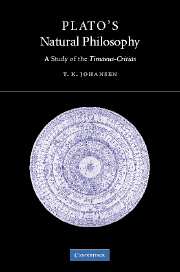Book contents
- Frontmatter
- Contents
- Acknowledgements
- Introduction: Plato's tales of teleology
- 1 What is the Timaeus-Critias about?
- 2 The status of the Atlantis story
- 3 The status of Timaeus' account
- 4 Teleology and craftsmanship
- 5 Necessity and teleology
- 6 Space and motion
- 7 Body, soul, and tripartition
- 8 Perception and cosmology
- 9 Dialogue and dialectic
- Epilogue
- Bibliography
- General index
- Index locorum
2 - The status of the Atlantis story
Published online by Cambridge University Press: 03 September 2009
- Frontmatter
- Contents
- Acknowledgements
- Introduction: Plato's tales of teleology
- 1 What is the Timaeus-Critias about?
- 2 The status of the Atlantis story
- 3 The status of Timaeus' account
- 4 Teleology and craftsmanship
- 5 Necessity and teleology
- 6 Space and motion
- 7 Body, soul, and tripartition
- 8 Perception and cosmology
- 9 Dialogue and dialectic
- Epilogue
- Bibliography
- General index
- Index locorum
Summary
In chapter 1 I considered the aim of the dialogue as a whole and the connections between the Atlantis story and Timaeus' account of the cosmos. In this chapter I try to answer the question about the status of the Atlantis story as ‘history’ or ‘fiction’. In the next chapter I go on to investigate the status of Timaeus' account.
From antiquity on, the status of Critias' account has been the subject of intense debate. Are we as readers supposed to take the Atlantis story as ‘real history’? The dialogue invites us to raise this question but also to reflect on its terms. In this chapter I argue that the story should be seen as ‘history’ only in a special Platonic sense: it is a story which is fabricated about the past in order to reflect a general truth about how ideal citizens would fare in war. The story thereby provides a practical example of how virtue, understood along the lines of the Republic, would prevail in this world even in the most adverse of conditions.
As we have seen, the Timaeus-Critias tells two stories. One is an account of the war between ancient Athens and Atlantis; the other is an account of the creation of the kosmos and everything in it. Critias and Timaeus tell their stories in response to Socrates' request to be entertained in return for the entertainment he provided yesterday, which was an account of an ideal city very similar to that of the Republic.
- Type
- Chapter
- Information
- Plato's Natural PhilosophyA Study of the Timaeus-Critias, pp. 24 - 47Publisher: Cambridge University PressPrint publication year: 2004



